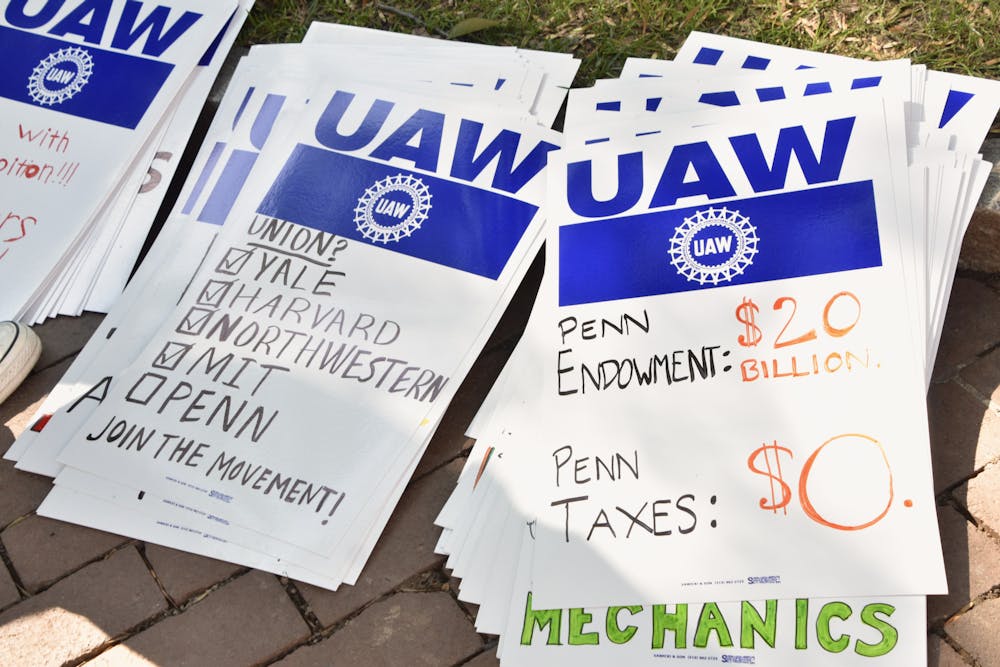During negotiations with graduate student union representatives, Penn struck provisions related to international and immigrant workers and job recognition — a move the union called “severely inadequate.”
Graduate Employees Together — University of Pennsylvania, which represents 3,700 student workers, began negotiations with University administrators in May 2024. The University presented four counterproposals to GET-UP drafts regarding graduate workers’ job expectations, scheduling, recognition, compensation, and support for international and immigrant workers.
Penn’s counterproposals included significant changes to the union’s original articles, such as removing provisions that would have ensured reimbursement of visa and immigration fees for international graduate employees, as well as support for nonimmigrant graduate employees who are denied entry to the United States. According to a copy of the document reviewed by The Daily Pennsylvanian, Penn also struck proposals that ensured there would be no proof of citizenship or immigration status requirements for those in the union.
In their proposal on “Recognition,” GET-UP outlined what specific job titles would fall under their union. The University added a section that excluded educational fellowship recipients in lab rotations in the first year of the biology Ph.D. program and the first and second years of the Biomedical Graduate Studies Ph.D. program from the union’s bargaining unit.
In a statement posted to their website, GET-UP emphasized that “these RAs do the exact same work as other workers in our union and should have the same rights and protections!”
According to Oishi Bardhan, a third-year immunology Ph.D. student and member of GET-UP’s bargaining committee, Penn’s counterproposal promotes an idea that “grad workers don’t provide substantial research services for the University.”
In an interview with the DP, Bardhan characterized the sentiment as “frustrating,” citing many BGS students who have “produced data that’s been either published or included in grants or … patent applications and are actively bringing in money for the University as well.”
Bardhan added that Penn “explicitly tri[ed] to exclude these EFR grad workers when they’re doing labor for the University.” She described the workers as “a vulnerable group of students because they’re just coming into Penn.”
RELATED:
Penn strikes antidiscrimination protections in graduate student union contract bargaining
AAUP-Penn calls on University to end ‘anti-union campaign’ in statements of solidarity with RAPUP
“Students on rotations don’t have a thesis lab yet, so obviously they deserve the same rights under the contract as other grad workers,” Bardhan added.
Penn’s response — while a setback for the union — was not a surprise, according to a GET-UP organizer who requested anonymity due to fear of retribution.
“Not only did they give a response that is not what we wanted, they didn’t even engage in most of the points,” the organizer told the DP. “They just struck everything out, which we think is slightly disrespectful for the amount of work we do. Understandably, it’s not their job to be respectful. But it just feels very disappointing that we don’t even deserve to have a decent response and a good ground to negotiate on.”
“We certainly hope that the university will engage more with better faith,” they continued. “But I wouldn’t say this is unexpected.”
As part of the negotiations, the union also asked Penn to increase financial support for International Student and Scholar Services. In their statement, GET-UP criticized the University’s “reluctance to properly invest” in ISSS, noting “the significant and concerning policy changes being pursued by the Trump administration.”
“If it’s something that [Penn] has any interest in, the response should not look like that,” the GET-UP organizer said. “But this is what we currently have, and we’re actively trying to figure out what we can do on our end, through organizing and through negotiating to move this proposal forward.”
“Properly investing in ISSS … it’s the bare minimum thing that [Penn] could do,” they continued. “I just don’t see a way for the staff members to be able to assist every single international student if they have to deal with so many. And all of us are in unique situations, especially complicated by the current political climate. We need someone who knows what is going on to help us navigate it, and it’s hard for the staff members themselves because of this sheer number that they’re dealing with.”
The changes come after Penn struck antidiscrimination protections from bargaining documents in March 2025. GET-UP and the University have not yet reached an agreement on protections against discrimination, harassment, and abuse. According to GET-UP’s bargaining tracker, the parties have not reached agreements on 20 articles and have reached tentative agreements on 14 proposals.









